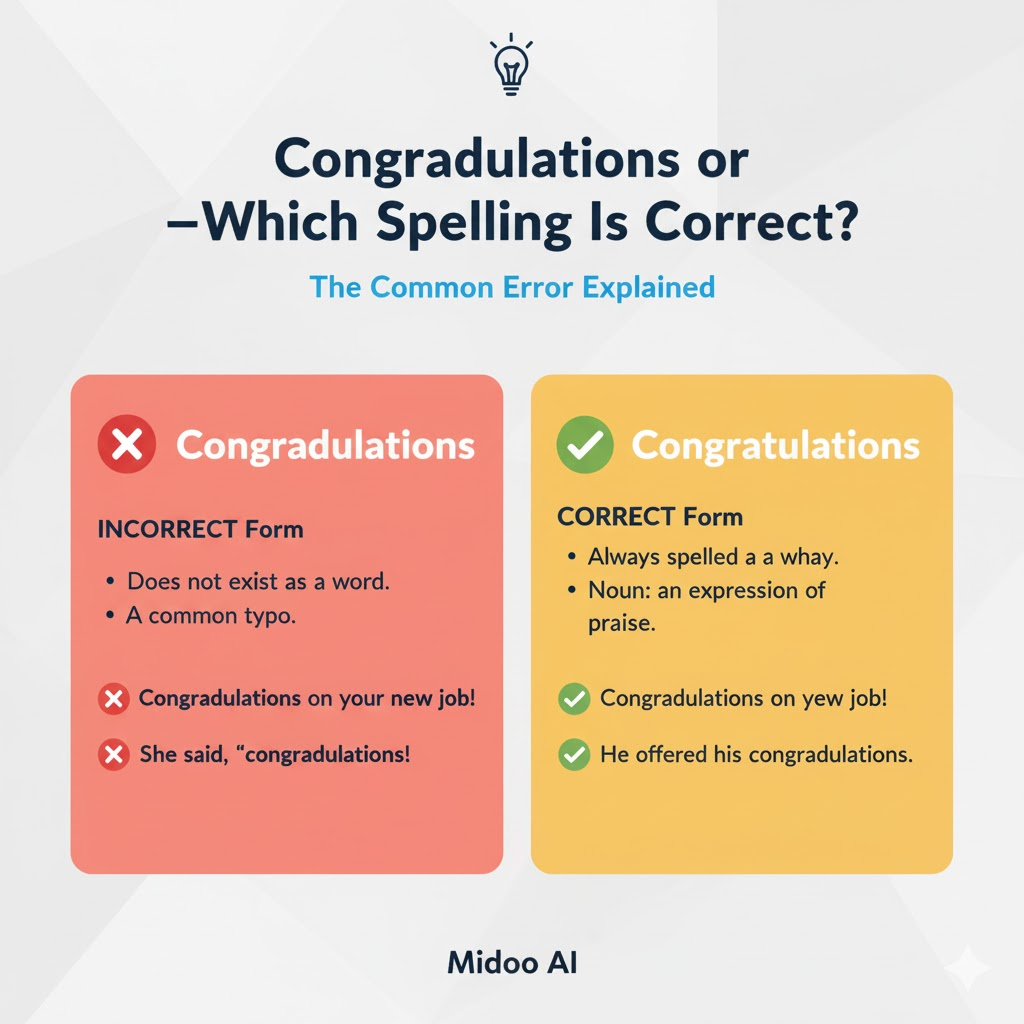Congradulations or Congratulations—Which Spelling Is Correct?

If you’ve ever written “Congradulations!” in a hurry after seeing a friend’s achievement online, you’re not alone. Many English learners—and even native speakers—make this common spelling mistake.
At Midoo AI, we’ve analyzed thousands of English posts, and one of the most frequent typos we detect is “Congradulations” instead of “Congratulations.” So, let’s clear the confusion once and for all: only “Congratulations” is correct.
In this article, we’ll explain why “congradulations” is wrong, what the word “congratulations” really means, and how to use it naturally in your writing.
1. The Correct Word: “Congratulations”
✅ Congratulations is the correct spelling.
❌ Congradulations is a common misspelling.
The word comes from the Latin congratulatio, meaning “to express joy or share in someone’s happiness.” It’s built from “con-” (together) + “gratulor” (to give thanks or joy).
That “grad” in the middle might remind people of graduate, but they’re not the same root—hence the confusion.
2. Why “Congradulations” Is Incorrect
Many people mistakenly write “Congradulations” because it sounds similar when spoken aloud. The “gra” sound in “congratulations” often blends with the “dʒ” sound (like “graduate”), especially in fast speech.
However, the correct spelling is congratulations, with a “t” — not a “d.”
Think of it this way:
You say “congratulate someone,” not “congradulate someone.”
That’s your best clue that “congratulations” must be spelled with a t.
3. Examples of “Congratulations” in Sentences
Congratulations on your promotion!
We’d like to offer our heartfelt congratulations to the winners.
Congratulations, you’ve passed the final exam!
Send my congratulations to your parents.
Congratulations on your new home—it’s beautiful!
✅ Tip: “Congratulations” is almost always used in the plural form because it represents an expression of joy shared among people.
4. Variations and Related Phrases
- To congratulate (verb): “I congratulate you on your success.”
- Congratulatory (adjective): “She sent a congratulatory message.”
- Congratulations! (exclamation): “Congratulations! You did it!”
You can also combine it with phrases like:
- “Congratulations on your engagement.”
- “Congratulations to the entire team.”
🧠 Tip from Midoo AI: Always pair congratulations with “on” when referring to an achievement.
5. Common Mistakes to Avoid
| ❌ Incorrect | ✅ Correct |
|---|---|
| Congradulations on your new job! | Congratulations on your new job! |
| I want to congradulate you. | I want to congratulate you. |
| Congradulations to the happy couple! | Congratulations to the happy couple! |
💡 Quick Memory Trick:
If you ever feel tempted to type “Congradulations,” just remember—you graduate, but you congratulate.
6. Why People Confuse Them
It’s easy to see why “congradulations” became common. The words graduate and congratulate often appear in the same situations—especially during graduation season!
When someone graduates, people say, “Congratulations!” The “grad” connection creates an illusion that the word should contain “grad.”
But it doesn’t. The “t” spelling reflects the true Latin root of the word, not the modern English “graduate.”
7. Real-Life Usage Examples
| Context | Correct Usage |
|---|---|
| Birthday message | “Congratulations on turning 30!” |
| Work achievement | “Congratulations on your promotion!” |
| Graduation | “Congratulations to the Class of 2025!” |
| Wedding | “Congratulations to the newlyweds!” |
| Online message | “Congratulations 🎉 You deserve it!” |
8. Midoo AI Writing Tip
When you use Midoo AI, the system automatically catches misspellings like “Congradulations” and suggests the correct form, “Congratulations.”
Our AI writing assistant doesn’t just fix typos — it also explains why the correction matters, helping learners avoid repeating the same mistakes in the future.
FAQs
Q1: Why do people spell it “Congradulations”?
Because it sounds similar to “graduate.” People associate the two words, especially during graduation events, and replace the “t” with a “d” unconsciously.
Q2: Is “Congradulations” ever acceptable?
No. It’s a nonstandard spelling and is considered incorrect in all forms of English.
Q3: What’s the singular form of “congratulations”?
There isn’t one in modern English. “Congratulations” is always plural, even when directed at one person.
Q4: How can I remember the correct spelling?
Use this trick: You graduate, but you congratulate.
Graduation = noun, Congratulation = action.
Q5: Does “congratulations” always need an exclamation mark?
Not always, but it’s common in informal messages or posts (e.g., “Congratulations!”). In formal writing, you can end the sentence with a period.
Final Tip from Midoo AI
The next time you type a celebratory message, remember:
It’s Congratulations, not Congradulations.
“Congradulations” might sound right, but it’s a classic example of how English pronunciation can mislead spelling.
Stay confident, write correctly, and let Midoo AI guide your English so you can send your messages with accuracy — and flair.